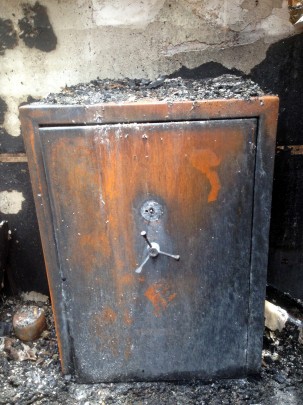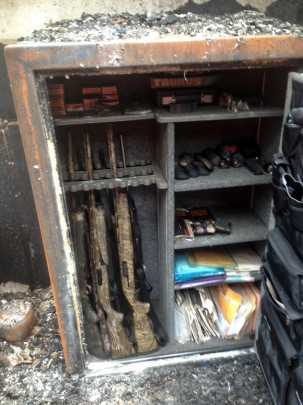Q. Do I need a safe?
A. Yes! Everyone has things they need to protect. Even if you don’t have expensive guns, jewelry, or collectibles, personal papers like social security cards, records, car titles, and insurance policies also are critical to protect. Identity theft is on the rise! Businesses, as well as handling money, also must protect sensitive information for their clients.
Aside from your personal information, you also have sentimental items. If old family pictures and heirlooms are stolen or destroyed in a natural disaster, those things are irreplaceable. Having a safe ensures that all your possessions, whether of high monetary value or of personal significance, are preserved for you and your family. In the course of a lifetime, we all will have things that are important to us that we need to protect. Don’t be like so many of our customers in the past and wait until after the break-in or after the fire to buy a safe.
Q. How do you choose the right safe?
A. First, you need to be educated on the differences. If you have expensive jewelry, cash, collectibles, etc. to protect, then you should consider jewelry and high security safes. If you are trying to secure a few papers and maybe keep a handgun away from the children, a record or fire safe might be the right choice. It all depends on what you are trying to protect.
Next, you have to decide how much room you would need inside the safe. Mentally put everything you would put into a safe in a box and add at least half again more room for growth. Let’s face it; you will accumulate more valuables as time goes by. Also, when considering how big of a safe to purchase, determine where you would want it in your home or office. Keeping these things in mind will give you a more specific idea of what kind of safe is best for you.
Q. Are all of your safes fireproof?
A. No safe is completely impervious to fire. A raging fire will damage any safe, but there are ways to make some safes significantly more resistant to fire than others. Certain safes are made specifically to withstand burglaries, not fires, and do not hold up against the high temperatures. However, other safes are made specially to withstand fires (or even both burglaries and fires, such as a liberty gun safe).
Liberty Safes in particular are engineered to endure fires and other natural disasters. Liberty Safes have survived tornadoes, hurricanes, and intense fires! The images on the right depict a Liberty safe after a devastating home fire—with it’s contents completely intact!
A safe’s level of fire capacity is measured in a unit called BTU (British Thermal Unit). The higher the BTU, the better protected the safe is from fire. The BTU of a safe depends on three factors: the amount of fireboard in the safe’s walls, the construction of the safe, and the steel content. If a safe has a lot of fireboard, is well-constructed, and is made of thicker steel, it will be more resistant to fire.
Q. Where is the best place to put my new safe?
A. The best place would be “out of sight.” If people don’t know you have one, they won’t be curious about what is in it. Police have said repeatedly that a lot of break-ins are performed by someone who is known by the homeowner—someone who knows what you have.


When considering the placement of your safe, also remember that the safe should be in a place where it is easy for you to access. If it is in the dank corner of a basement, or shoved back in a closet, the lighting may to too poor to easily see the hash marks on the combination lock. While having your safe “out of sight, out of mind” means that burglars won’t think to break into it, it also may mean that you—as the customer—rarely remember to use it. Put your safe in a place that is not in a high-traffic area of your house, but not somewhere you forget it exists.
Q. When should you use a wall safe?
A. Wall safes hidden behind old portraits are popular on TV, but don’t quite serve the same purpose in real life. Filling a wall safe with money and jewelry may not be a good idea. While hiding a wall safe behind clothes in a closet or behind a painting of Yellowstone may seem like an incredibly sneaky place that thieves will never think to look, remember that burglars already plan on looking in obscure places for valuables (i.e. under the mattress, in bookshelves, etc). True, a burglar might overlook a well-hidden wall safe, but if they find it, rather than breaking in, they could easily cut the safe from the wall and take it with them.
Rather than for storing money, a wall safe is better suited for safeguarding prescription medications, and keeping them away from children.
Individual Questions
Feel free to reach out to us with your own questions about our safes or locksmith services!
